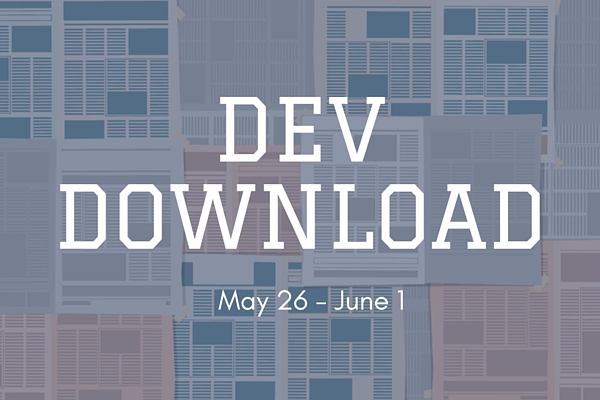The Dev Download is a weekly compilation of news clips relevant to software developers. The weekly report includes articles dated from the preceding Thursday to Wednesday, and covers a variety of tech industry topics.
Privacy
Supreme Court Shows the Way on Privacy Regulations (The Hill, 5/27)
A recent U.S. Supreme Court decision has set the precedent for a “harms-based approach” to privacy litigation. This ruling will make the legal framework for cases more efficient, and prevent frivolous lawsuits that stifle innovation. The Alliance recently published a blog about this Court decision.
Wireless Industry Hits FCC Internet Privacy Rules (The Hill, 5/27)
Chairman Tom Wheeler of the FCC has proposed new and stricter privacy rules for internet service providers that would require user consent for most uses of their data. Industry groups like the CTIA have spoken out against the proposal, claiming it “harms consumers” while being “inconsistent” with existing privacy laws from the FTC.
Government Surveillance and Cybersecurity
Senate Panel Delays Email Privacy Vote Amid Concerns (The Hill, 5/26)
After nine amendments were filed last Wednesday evening, the Senate Judiciary Committee delayed the scheduled markup of an email privacy bill whose companion bill passed the House unanimously. The Committee plans to consider the Republican-sponsored amendments, along with the concerns of privacy advocates claiming they weaken ECPA reform.The Alliance supports the House-passed version of the bill, which already includes significant compromises.
Facebook Messenger to Feature Optional End-To-End Encryption: Report (The Hill, 5/31)
Facebook will soon offer users the ability to encrypt their messages in its popular messaging app via an opt-in feature. This end-to-end encryption option would ensure messages are secure and viewable only by the sender and receiver.
Push for Encryption Law Falters Despite Apple Case Spotlight (Reuters, 5/27)
Less than a year after lawmakers began to advocate for the creation of backdoors, master keys, and mandatory decryption technology, the charge has slowed. Without solid support from Congress, the White House, or the tech industry, regulations for unwarranted and intrusive mass government surveillance have faltered.
What the US Government Really Thinks About Encryption (Christian Science Monitor, 5/25)
While some see the debate over encryption as black-and-white between individual privacy and national security, the Obama administration finds itself in-between. Varying opinions from federal agencies, law enforcement, the tech industry, and privacy advocates have led to an often unclear position from the White House.
Data Flows
Crucial U.S. Privacy Deal Won’t Stand Up In Court, Says Top EU Adviser (Forbes, 5/30)
Privacy Shield, the framework governing transatlantic data flows meant to replace the now-invalidated Safe Harbor, has come under intense scrutiny. EU Data Protection Supervisor Giovanni Buttarelli claims the deal is not “robust” enough in protecting the personal data of European citizens. The U.S. Department of Commerce has already approved the agreement, and the Alliance believes a framework is important for businesses currently operating in a state of uncertainty.
Microsoft and Facebook Are Building the Largest Trans-Atlantic Cable Yet (TechCrunch, 5/26)
To combat the ever-growing customer demand for internet speed and connectivity, Microsoft and Facebook will work together to build a subsea cable stretching from Virginia to Spain. Over 4,000 miles in length and with eight fibers, the cable will be the highest capacity in existence and is expected to be finished by October 2017.
Facebook Case Calls Transatlantic Data Transfers Into Question (The Hill, 5/25)
Europe’s high court will review contractual language used by companies like Facebook which permits the transatlantic transfer of consumer data, a form of trade worth a trillion dollars. European privacy advocates fear that U.S. laws do not adequately protect the personal information of EU citizens, and if the court agrees with them it could drastically change the way companies transfer data across the Atlantic.
Patent Litigation Reform
U.S. Innovators Dogged by Money-Grubbing ‘Patent Trolls’ (PBS NewsHour, 5/26)
Alliance Board Member Todd Moore of TMSoft, a patent troll victim, discusses his experience in a PBS NewsHour segment on how patent trolls stifle innovation and economic growth.
Internet of Things
One Chip to Rule Them All? The Internet of Things and the Next Great Era of Hardware (TechCrunch, 5/28)
Hardware manufactures have consistently been under pressure to improve performance while manufacturing smaller components. This pressure will soon increase with the proliferation of IoT devices, many of which require complex sensors, processors, and memory chips to fit into small devices.
The Sweep of the Internet of Things, Garbage Cans and All (TechCrunch, 5/27)
Thanks to the growing number of IoT devices in our everyday lives, we could soon see a revolution in our energy efficiency with programs like Cleantech 3.0. These are meant to “democratize” energy consumption, making it easier to be aware of usage by providing tools to better understand and manage resource allocation.
Miscellaneous
Facebook, Twitter, Google, and Microsoft Agree to EU Hate Speech Rules (The Verge, 5/31)
The EU has provided social media platforms a new set of regulations on reviewing and dealing with online hate speech in an effort to combat terrorist propaganda and xenophobic dialogue. In yet another example of tech companies working to address the misuse of their platforms, they intend on enforcing them without hampering the free flow of information across their sites by law-abiding users.
Trump Candidacy Unites Silicon Valley- In Horror (Seattle Times, 5/29)
Many in the innovative world of Silicon Valley have united in their distaste for presumptive Republican presidential nominee Donald Trump. While his opposition is not unanimous in the tech world, those who disapprove of Trump cite issues with his immigration and trade policies, as well as his treatment of the tech industry as a whole.
Michigan Puts Forward Bills to Allow for Public Sales of Driverless Cars (Wall Street Journal, 5/28)
While some states, including Michigan, only allow for testing of driverless vehicles, new legislation would allow for the operation of these vehicles on public roads, opening the door to the next generation of transportation. The proposed bills come after the “Detroit Three,” General Motors, Fiat Chrysler, and Ford, all announced investments in driverless technologies.
Google Beats Oracle on Copyright, Defeating $9 Billion Claim (Bloomberg, 5/26)
In a closely watched case that could have had far-reaching implications for software developers, Google won a verdict that now provides a precedent for programmers to continue to write applications on different platforms without licenses.
Tesla’s Patent Strategy Opens the Road to Sustainability for Transport and for Itself (TechCrunch, 5/26)
While many companies are forced to deal with malicious patent “trolls,” Tesla is allowing anyone to use their patents for their electric vehicles for free, so long as users are operating in “good faith.” In doing so, Tesla hopes that their market for electric vehicles, and subsequently their industry value, will grow exponentially.





